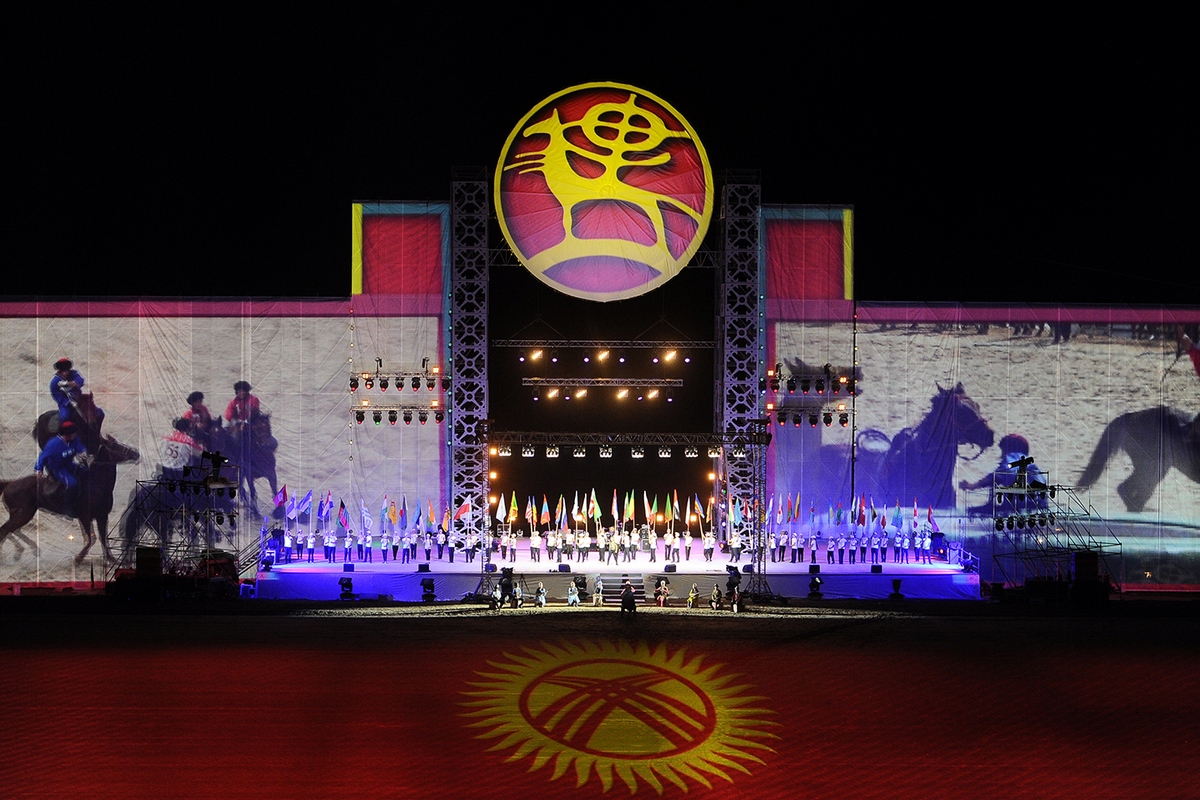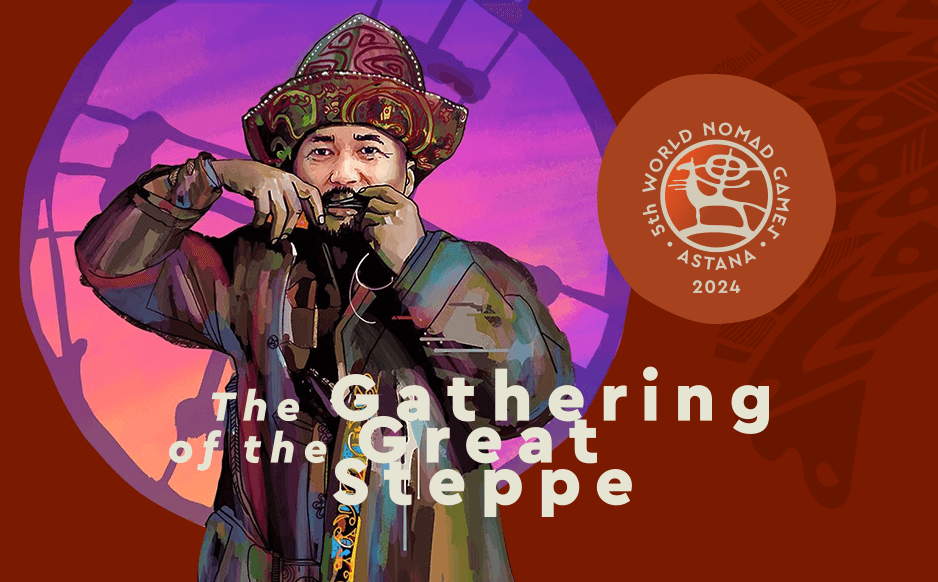About the World Nomad Games
The World Nomad Games are the biggest international project held in the Kyrgyz Republic, a project initiated by the government in 2012 for the revival and preservation of the culture of nomadic civilization.
Author and head of the project "World Nomad Games" is Akibaev Askhat Akibaevich.
The organizer of the World Nomad Games is the Government of the Kyrgyz Republic. Co-organizer of the World Nomad Games is the World Ethnogames Confederation.
The First World Nomad Games were held from September 9th through 14th, 2014, in Cholpon-Ata, in the Issyk-Kul Province of Kyrgyzstan. 583 athletes from 19 countries participated in competitions held in 10 types of sports, plus an additional 1,200 participants in the cultural program. The television broadcast of the Games reached 230 million people.
The Second World Nomad Games were held from September 3rd through 8th, 2016, in Cholpon-Ata, in the Issyk-Kul Province of Kyrgyzstan. 1,200 athletes from 62 countries participated in competitions in 26 types of ethnosports, which were broadcast to 500 million people.
The opening ceremony of the Third World Nomad Games is planned for September 2nd, 2018, in Cholpon-Ata, in the Issyk-Kul Province of Kyrgyzstan. The competitions themselves will be held in five locations.
3,000 athletes from 77 countries are expected to participate in competitions in 37 types of ethnosports.
MISSION OF THE THIRD WORLD NOMAD GAMES
The World Nomad Games are aimed at developing the ethnosport and ethnoculture movement in the world, as this is the heritage of human civilization.
The mission of the World Nomad Games covers the revival, development and preservation of the ethnoculture, diversity and originality of the people of the world in order to foster a more tolerant and open relationship between people. The slogan of the Third World Nomad Games is “United in Strength! United in Spirit!”.
GOALS AND OBJECTIVES OF THE THIRD WORLD NOMAD GAMES
- Preserving the cultural and historical heritage and diversity of peoples from around the world in the era of globalization;
- Developing the world ethnosport movement;
- Popularizing, developing and promoting ethnosports at the world level, including traditional games and competitions from around the world;
- Support for the scientific and methodological foundation of the ethnosport movement, including ethnosports, traditional games, and traditional competitions;
- Strengthening and further developing interfaith and intercultural dialogue, understanding, friendship, harmony, and cooperation between the people of the world, and demonstrating the cultural diversity of the world.
Special attention at the World Nomad Games is paid to ecology. The official mascot of the World Nomad Games is the snow leopard. The organizers of the Games hope to bring extra attention to the plight of the snow leopard and to saving the habitat of this unique animal.
FEATURES OF THE THIRD WORLD NOMAD GAMES
The 2018 World Nomad Games feature three main parts:
- Ethnoculture
- Ethnosport
- Science
ETHNOCULTURE
The ethnocultural program includes two parts: the Nomad’s Universe international cultural festival, which itself includes the following:
- Ethnohit (folklore and music);
- Ethnodance (traditional dances);
- Ethnofashion (traditional and modern clothing);
- Ethnobazar (exhibition and fair of traditional handicrafts);
- Recitations of epic poems and legends;
- Ethnohouse (traditional nomadic shelters).
The second part of the ethnocultural program of the Third Nomad Games will be the ethnovillage, called Kyrchyn, where large theatrical performances and final competitions will be held. Cultural programs and presentations will also be performed for guests in Kyrchyn, prepared by groups from Bishkek, Osh, and all seven provinces of Kyrgyzstan.
ETHNOSPORT
The ethnosport program consists of competitions in 37 types of sports.
TRADITIONAL GAMES:
- Ordo – a traditional game in the Kyrgyz Republic.
HORSE RACES:
- At Chabysh – races over a long distance;
- Kunan Chabysh – races of two-year-old horses;
- Jorgo Salysh – pacer racing;
- Byshty Jorgo – pacer racing of three-year-old horses;
- Flat races;
- Distance races.
HORSE GAMES:
- Kok-Boru – a traditional horse game in the Kyrgyz Republic;
- Er-enish – a traditional horse game from the Kyrgyz Republic, involving two wrestlers on horseback;
COMPETITIONS IN TRADITIONAL TYPES OF WRESTLING:
- Alysh – a traditional type of belt wrestling from the Kyrgyz Republic;
- Ashyrtmaly Aba Gyureshi – a type of traditional belt wrestling from the Republic of Turkey;
- Goresh – a type of traditional belt wrestling from Turkmenistan;
- Gushtini Milli Kamarbandi – traditional wrestling from Republic of Tajikistan;
- Gyulesh – traditional wrestling from the Republic of Azerbaijan;
- Kurash – traditional wrestling from the Republic of Uzbekistan;
- Kazakh Kuresi – traditional wrestling from the Republic of Kazakhstan;
- Kyrgyz Kurosh – a type of traditional belt wrestling from the Kyrgyz Republic;
- Mongol Bokh – traditional wrestling from Mongolia;
- Pahlavani – traditional wrestling from the Islamic Republic of Iran;
- Sambo – traditional wrestling from the Russian Federation;
- Ssireum – traditional belt wrestling from the Republic of Korea;
- Sumo – traditional wrestling from Japan;
- Great Nomad Wrestling – combined freestyle belt wrestling;
- Gushtini Milli Kamarbandi – traditional belt wrestling from Tajikistan.
COMPETITIONS IN TYPES OF MARTIAL ARTS:
- Tug of War – a traditional worldwide sport;
- Mas-wrestling – traditional competition from the Russian Federation;
- Armwrestling – a traditional worldwide sport.
TRADITIONAL INTELLECTUAL GAMES:
- Toguz Korgool – an intellectual game from the Kyrgyz Republic;
- Mangala – an intellectual game from the Republic of Turkey;
- Oware – an intellectual game from west Africa.
COMPETITIONS IN ARCHERY USING TRADITIONAL BOWS:
- Archery using a traditional bow from the Kyrgyz Republic;
- Archery using a traditional bow from the Republic of Turkey;
- Archery using a traditional bow from the Republic of Korea;
- Archery using a traditional bow on horseback from the Kyrgyz Republic and the Republic of Turkey;
- Archery using a traditional bow at a distance from Hungary.
COMPETITIONS IN TRADITIONAL HUNTING, SALBUURUN:
- Burkut Saluu – hunting with golden eagles from the Kyrgyz Republic;
- Dalba – hunting with hawks from the Kyrgyz Republic
- Taigan Zharysh – hunting with dogs from the Kyrgyz Republic.
NEW ADDITIONS FOR THE THIRD WORLD NOMAD GAMES: COMPETITIONS FOR THE GREAT WINNERS
GREAT NOMAD WRESTLING – The Great Nomad Wrestling will be freestyle belt wrestling held between the winners of each of the twelve types of traditional wrestling: Alysh, Aba Gyureshi, Goresh, Gushtini Milli Kamarbandi, Gyulesh, Kazakh Kuresi, Kurash, Kyrgyz Kurosh, Mongol Bokh, Pahlavani, Sambo, Ssireum, Sumo.
THE BOOK OF GREAT WINNERS – This book chronicles the achievements of the Great Winners at the World Nomad Games, and is formatted in an artistic and traditional style that reflects the nomadic traditions of people around the world.
DEMONSTRATION GAMES
Each participating country can present its own traditional games, sports, traditions, and entertainment as a demonstration, which will not be part of the competitive sporting program.
- Kok-boru on horses;
- Kok-boru on yaks;
- Kyz kuumai;
- Tyiyn enmei;
- Djigitovka;
- Camel races;
- Donkey races;
- And other traditional games.
SCIENCE
THIRD WORLD NOMAD GAMES’ SCIENTIFIC FORUM: HISTORICAL HERITAGE AND THE FUTURE
TASKS OF THE FORUM:
- Researching the role and place of the culture of nomadic peoples in the development of human civilization;
- Researching the theories of human civilization and forming theories and forming theories of nomadic civilizations;
- History and culture of nomadic civilizations;
- Researching the development of culture and the connection between traditional games and the lifestyle and traditions of peoples;
- Studying the phenomenon of the World Nomad Games as the historical heritage of the world’s peoples, their current conditions, and outlooks for the future;
- Scientific base for the various aspects of traditional physical culture and ethnosport;
- Forming a permanent platform as part of the World Nomad Games for researchers, academics, and the organizers of the Games.
EVENTS AS PART OF THE FORUM:
- Events at universities dedicated to the Third World Nomad Games, including themed scientific conferences, round tables, competitions and quizzes;
- The 61st Permanent International Altaistic Conference, titled “Traditional Games and the Traditions and Customs of Peoples”;
- A scientific conference entitled “The World Nomad Games: Historical Heritage and the Future”;
- A seminar entitled “The Rebirth, Preservation and Popularization of the Traditional Knowledge of Nomadic Peoples”;
- An international scientific forum entitled “Hawks and their Habitats, as A Problem of the Humanization of Human Society”.
The World Nomad Games has found wide support from countries in the Turkic Council, and has been included in documents such as:
- Joint Statement as a Result of the Official Visit of Prime Minister Erdogan to the Kyrgyz Republic on February 2, 2011;
- Anniversary Declaration between Kyrgyzstan and Turkey, dated January 12, 2012;
- The Bishkek Declaration, signed by the Turkic Council in 2012;
- Joint Statement on the Results of the 3rd Meeting of the Supreme Council for Strategic Cooperation Between Kyrgyzstan and Turkey, signed on June 3, 2014;
- The Bodrum Declaration, signed by the Turkic Council on June 5, 2014.
Holding the World Nomad Games was also supported by:
The General Secretary of the World Tourism Organization Taleb Rifai at the UNWTO Conference on Nomad Tourism and the Sustainable Cities on the Silk Road from October 13-15, 2016 in Ulaanbaatar, Mongolia.
Vice-President of the International Olympic Committee Juan Antonio Samaranch during the FITUR International Tourist Exhibition, held from January 18-22, 2017, in Madrid, Spain.
The President of the Olympic Council of Asia Ahmed Al-Fahad Al-Ahmed Al-Sabah, the President of Mongolia Tsakhiagiin Elbegdorj, the Head of the Republic of Kalmykia and the President of the World Chess Federation Kirsan Ilyumzhinov.
The President of TURKSOY Dusen Kaseinov, UNESCO, and the Council of Elders of the Turkic World.
The Final Declaration of the 7th Alliance of Civilizations, for WNG’s contribution towards promoting intercultural dialogue and strengthening social unity and peace, held in Baku, Azerbaijan in April, 2016.
Resolution of the General Assembly of the United Nations for the Promotion of Interfaith and Intercultural Dialogue, Mutual Understanding and Cooperation for Peace, held on December 22, 2016 in New York, USA.





